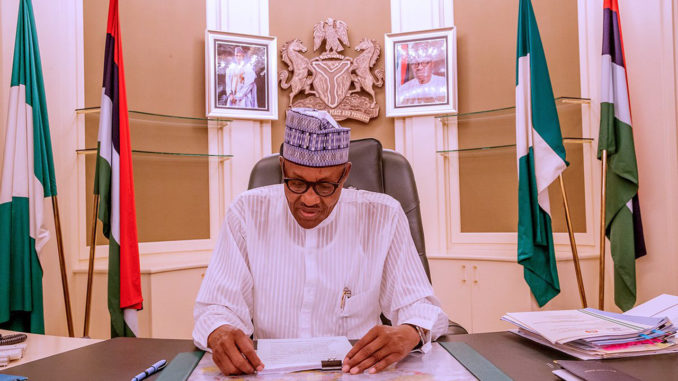
When President Muhammadu Buhari stated the other day that N1 trillion had been wasted on constituency projects in the last 10 years with no direct bearing on the lives of ordinary Nigerians, he was only re-affirming the magnitude of corruption that has underdeveloped the country he leads at this moment. True and hackneyed as this statement seems, it calls for the decisive and frontal attack that must be seen to be comprehensive and total.
As if pre-empting critics of this administration who might be wondering whether this government has the sincerity of purpose to address this issue, Buhari urged “the legislative and judicial arms of government to embrace and support the creation of the Special Crimes Court.” The President was said to have made this statement at the national summit on “Diminishing Corruption in the Public Service’’ organised by the Independent Corrupt Practices and other Related Offences Commission (ICPC) in collaboration with the Office of the Secretary to the Government of the Federation in Abuja.
As Nigerians have been made to understand, constituency projects are contrivances inserted by lawmakers in the federal budget to ensure tangible infrastructural projects are made available in all the legislative constituencies across Nigeria. What this does is to establish government presence all over the country, theoretically. And this government presence should be established by legislators who attain their political positions through elections from 569 electoral constituencies in the country.
While in principle this arrangement makes sense for a country like Nigeria, in practice it is a controversial recipe for corruption. An insight report carried out last year highlighted that thanks to constituency projects, a friend or associate of leaders of the National Assembly could become wealthy overnight through the national budget. According to the report, most lawmakers lobby heads of ministries and relevant government agencies to insert flimsy projects as constituency projects and also arrange with friends or cronies or even spouses to disguise as contractors to get contracts through these dubious means.
In spite of overwhelming condemnation, certain arguments have been adduced as justification for constituency projects. Owing to illiteracy and lack of understanding of the dynamics of constitutional democracy, the electorate tend to view the politician as one who must provide the so-called dividends of democracy, by which is meant the execution of projects. Like all politicians, the lawmaker is expected to demonstrate the relevance of position to his electorate by pointing out to something practical or palpable that he or she has for the people who elected them. In other words, the need for the electorate to feel the impact of a politician in his constituency has necessitated the creation of these phantom constituency projects.
This newspaper maintains its earlier position that constituency projects and such other contrivances of the National Assembly that confer privileges on legislators as executors of projects are an aberration. Although the National Assembly has rules guiding its activities at both the Senate and the House of Representatives on matters of constituency projects where the National Assembly interfaces with the populace, it lacks constitutional backing.
Beside the absence of a legal basis, it is also faulted on moral grounds. While it duplicates activities that are already being provided for by another arm of government as well as other tiers of government, it also exposes legislators to ignoble activities that undermine the sacred duty of the lawmaker.
Moreover, precedents have shown that the idea of constituency projects is a fraudulent scheme for unconscionable self-enrichment of legislators. Such an idea subsists on the assumption that legislators are special persons whose actions are special and whose crimes are special and as such deserve special courts. Nigerians would recall that the scandals of budget padding, which seem to have paled out of news reports are nevertheless obstinately fresh in the memories of Nigerians.
It is for this reason that we call for caution with regard to the president’s invitation for support of the introduction of Special Crimes Courts. Indeed, the nation is about to perish which creates too many laws. There seem to exist too many monitoring groups doing the same thing. Rather than duplicate groups and agencies to fight corruption, the Federal Government must diligently match its narratives of anti-corruption with commensurate action. There is absolutely no basis to ‘‘specialise’’ any criminal activity that has been enshrined in the laws and penal codes of the land. The lack of trust and the suspicion of the incapacitation of the central government as well as its perceived lack of political will to spread development projects equitably across the country are some of the factors that have made the constituency project a necessity.
So, rather than glory in constituency projects, legislators should deploy their political clout and sagacity to deliberate on issues that would alleviate poverty and bring in desserts that make for the good life.
To the electorate who see legislative positions as opportunities for their elected leaders to grab as much as possible from the centre and erect infrastructures in their constituencies, it is high time they were educated on the functions of legislators. If the misconception persists, it is because the lawmakers have failed to educate themselves and their electorate about the proper functions of the members of the legislative arm of government.
Let it not be said that the hackneyed swipes are taken at corruption and fraudulent activities of political and public office holders are merely a bulldog’s bark or a butterfly’s punch. The government must not be seen to be ridiculing itself when it comes out to denounce corrupt practices, as certain symbolic gestures of this administration advertise corruption in a most obscene manner. In other words, the President has a responsibility to address certain critical challenges through the ruling party caucuses at various levels instead of playing to the gallery about fighting corruption.
END

Be the first to comment